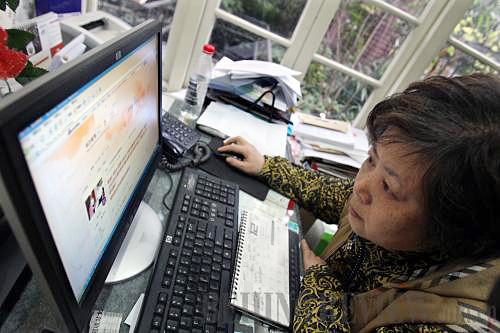|
 |
|
A NET STAR: Bai Wanqing, a people's mediator in Shanghai who is called "auntie Bai" by local residents in her community, is famous for her skills of tackling civil disputes (LIU YING) |
"The law came in time for us," said Wang, the mediator in Beijing. He believes the law will help mediators overcome some obstacles.
According to him, for a long time, most of the mediators worked under great pressure, with low salary, heavy workloads and difficulties in solving complicated disputes.
"Even worse, it makes us frustrated when no one, including our families, can understand the pressure we work under," he said.
Wang loves his job. "Without enthusiasm, I could not have kept working till today," he said. "With the law, we can concentrate on helping people resolve their disputes, because the law guarantees our rights and interests and provides a legal basis to us."
A legal promise
The law could help resolve civil disputes through negotiations under the guidance of a local mediation committee, eliminating the need for a lawsuit, Wu said. "Mediation should be the first line of defense to maintain social stability and promote harmony."
The law establishes the people's mediation committee as the legal organization to resolve everyday disputes, and sets down the procedures for formation of such an organization within community committees in cities and village committees in the countryside.
It's stipulated that people's mediation committees shall observe the principles of mediating on the basis of free will and equality of the parties concerned, abiding by laws, regulations and policies of the state, and respecting the rights of the parties concerned, and refraining from stopping the parties concerned from protecting their rights through arbitration, administrative means or judicial means in the name of mediation.
The law makes it clear that a mediation committee is composed of three to nine members with a term of three years.
Members of such committees should be honest, fair and keen on helping others to solve problems.
They should have certain social and legal knowledge. If they are found to be partial or taking bribes, they will be punished or even dismissed.
Wang said that a mediator should have three basic abilities—patience, negotiation and judgment.
When mediating a dispute, the mediator should be patient to make clear the causes and key points of the dispute and then make a judgment quickly according to his or her own legal knowledge.
"The key comes in the last stage. That is to give a clear explanation to the parties involved and to help forward communication between them and finally realize the reconciliation," Wang said.
The law also stipulates that governments at county levels and above shall provide financial support for mediation work and shall honor and reward outstanding mediation committees and mediators.
To popularize the method, the law streamlines the relation between mediation and other kinds of dispute resolution methods. It provides that courts at the grassroots level, as well as police offices, should inform parties involved in disputes about the possibility of solving such disputes through mediation.
Nonetheless, the law stipulates that mediation should be carried out in accordance with the parties' real intent. If one of the parties in dispute has explicitly refused to resolve the problem through mediation, the mediation should not be undertaken.
Previous reports show the mediation system was occasionally abused as a measure to prevent massive petitions from reaching upper-level governments.
Fortunately, the new law recognizes this problem and stipulates that if a mediation committee cannot talk two parties into an agreement, it should end the mediation process and let them move on to arbitration or court procedures.
The execution of the law is just a first step, Wu said. Further amendment may be needed in the future to facilitate the practices of mediation committees so that more civil disputes in a wider range of fields will be settled by mediation rather than through judicial procedures. | 